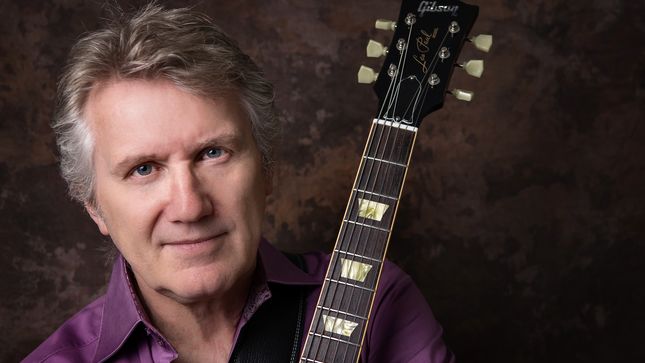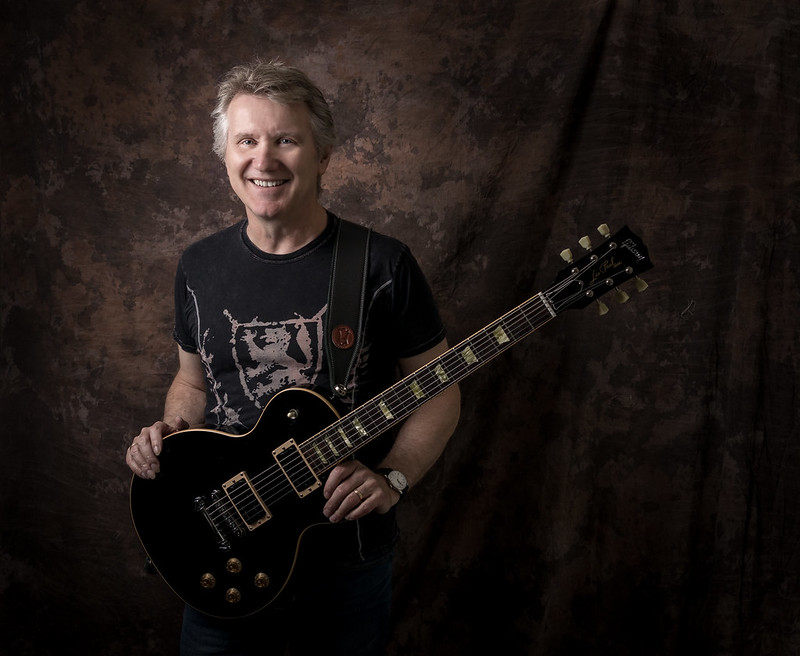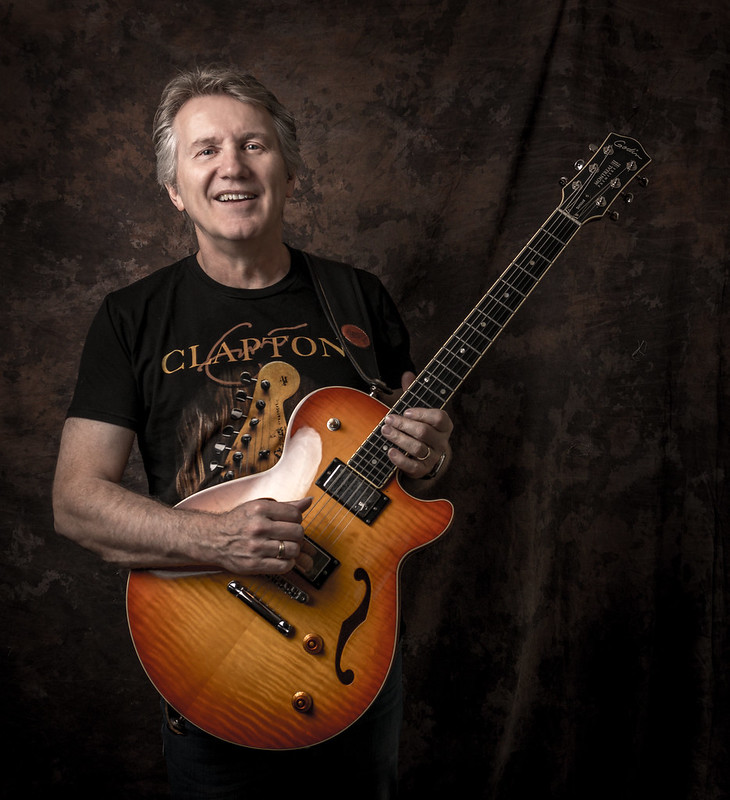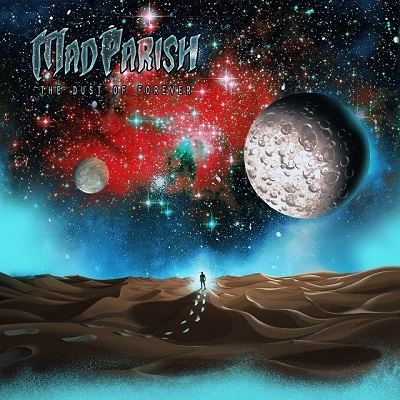RIK EMMETT Talks Solo Reissues, Favorite TRIUMPH Album – “I Would Pick Allied Forces; No Question”
August 11, 2020, 4 years ago

It’s not often that an artist gets eleven of their albums reissued all at once. But that is exactly what happened to former Triumph singer/guitarist Rik Emmett, when the folks at Round Hill Records reissued the following Emmett solo albums digitally, on July 10th – Ten Invitations (1998), Swing Shift (1998), Raw Quartet (1999), Live At Berklee (2000), Handiwork (2003), Good Faith (2003), Strung-Out Troubadours (2006), Live At Hugh's Room (2007), Liberty Manifesto (2007), Push & Pull (2009) and Marco's Secret Songbook (2012). Rik spoke with BraveWords correspondent Greg Prato about the reissues, as well as his former band and future plans/projects.
BraveWords: I was impressed by the wide variety of musical styles that the reissues touch upon.
Rik Emmett: “The background for it is of course, I had been in Triumph for thirteen years. And Triumph was kind of a fairly eclectic arena rock band, and not very progressive – but a little tiny bit of progressive mixed in with what would be considered ‘FM radio rock’…arena rock, through the ‘70s and ‘80s. When I left Triumph, there was management and record company pressures, saying, ‘Well, don’t drift away too far from that.’ I mean, I had always been somebody that had been sort of chomping at the bit – in terms of styles. There would be little jazz things that would find their way on rock records, and classical guitar pieces, and bluesy kind of things. So, the first three records that I made after Triumph – in ’89…’93, ’94, ’95, around there – they sort of gradually went from, ‘Here’s a rockin’ guy playing a Les Paul in a black leather jacket’ to ‘Here’s a singer/songwriter that’s writing the song that would be perfectly good for you to use as your wedding song.’ So, ballads and things – it was very much singer/songwriter.’
“And then, the industry had changed. The business was different. Nirvana had come, and Soundgarden – all that kind of stuff was happening. Rock radio had really changed. And I’m in my forties, and people are going, ‘Well…who cares about a mid-forties former rock n’ roll guy, who had hair that got him a lot of airplay on MTV? Forget that.’ In truth, I was sick and tired of the idea of managers and record companies, and sitting around. It’s not ‘art by committee,’ but it kind of is – when you’ve got heavy-handed producers and all the rest of that. The indie thing was just starting up, so I went, ‘OK. I’ve got my website. I’ll just set up a little digital studio in my own basement. I’ll start with a classical guitar record – because that’s simple. All I have to really learn to do is edit. And I’ll make my own records.’ That’s how I started – and that would have been ‘95/’96. In quick succession, I made a blues record, a jazz-swing record that was mostly archtop guitar. I went from there. I never lost any money making the records and putting them out and selling them – and going out to gigs and selling them off the stage. I was doing alright. And the budgets were pretty low, and people were doing favors for me – musicians coming in. That’s how it all started. So, to answer your question, literally all I had to do was satisfy myself. Whatever I was writing, whatever I was getting into, whatever I felt I wanted to indulge myself with, I would say, ‘OK. Collect these things in little piles. Here’s a boutique album that will sort of be jazz. Here’s one that will be singer-songwriter. Here’s one over here I have of classic guitar pieces and some instrumentals. And then the smooth-jazz thing was happening – there’s some radio here in Canada that would be playing smooth-jazz. And I liked smooth-jazz – I always liked George Benson and that style of guitar playing. If you took R&B and just blew in some modes over top and made sure there was a fair amount of pentatonic stuff going on – you could fit into that slot. Before I knew it, I was doing those. So that accounts for all of the eclectic nature of it all.”
BraveWords: Which of the albums are you most proud of?
Rik Emmett: “The first one, Ten Invitations From The Mistress Of Mr. E – which, talk about self-indulgence, there’s a title that won’t fit into any category – but it was classic guitar. That was sort of the record I’d been waiting all of my life to make – because the first guitar I ever owned was a nylon-stringed classical. And I used to play coffee houses when I was a teenager, and would play James Taylor songs, and bastardized versions of Roy Clark’s ‘Malagueña’ and all that kind of stuff. So, I would say that one…followed closely by Swing Shift – which was the archtop jazz one. But it had little ballads on it and guitar pieces that I was really pushing myself. There’s a song on there called ‘Key Chain,’ which is still a huge bitch to play! If you were to ask me, ‘Hey Rik, what is the core of your guitar playing and music-making and songwriting?’ I started out as a guy on a sort of folk-acoustic guitar, so classical and fingerstyle was one thing. Then, very quickly, there was the whole Beatles thing, and everybody wanted to write pop songs that a rock band could do – that would especially intrigue the young ladies. And then, boom, the whole thing happened with Hendrix, Clapton, and the Yardbirds. Quickly, I’m morphing into a blues lead guitar kind of guy. Then as things went on, ‘Oh, how about progressive rock?’ Steve Howe from Yes became a huge role model for me, because one minute he’d be playing classical guitar, and then the next minute, he’s playing Portuguese, the next minute, he’s playing a double neck, the next, he’s playing slide guitar. I’m like, ‘OK…this guy’s for me. This is unbelievable!’ Plus, he’s playing on a big jazz archtop guitar. So, he became my role model when was 16/17/18. I think in terms of if you look at my discography, it’s…‘That’s who he is. He’s ALL those things’.”

BraveWords: Which album do you think hard rock fans would enjoy the most?
Rik Emmett: “I did a record with Mike Shotton, who’s a friend of mine – he’s a singer/drummer – called Airtime: Liberty Manifesto. It was very hard rock – it’s a very Protools kind of an album, because it’s just two guys doing all kinds of tracking and adding string parts and 57 vocal overdubs and layers and layers of electric guitar. We made deals for that record in Japan and Germany and all over Europe. We never toured – but that would have been around 2007. That’s the [most rocking] record that exists, for sure.”
BraveWords: Do you think that Triumph doesn’t get enough credit for helping popularize arena rock in the ‘80s?
Rik Emmett: “I’m not going to complain. [Laughs] When you start saying things like that and they appear in print or show up on a podcast, it makes it sound like you’re so full of yourself. I think it’s probably fair that Triumph gets overshadowed by Rush, Styx, Journey…man, how many albums did Journey sell? We played the Rose Bowl in California with Journey in 1982 – the Rose Bowl was full of these women that were waving their hands in the air like they just didn’t care. You could just see that there was another level. And Triumph wanted to get to that level, and I think Universal – MCA at the time, and in particular, Irving Azoff – thought, ‘This is going to happen. Triumph is going to get there.’ And it never really quite did. We were ‘FM rock,’ but we never made that transition over into having those giant hits – these AM radio/anthem songs. And I think that was partly because of the band itself. The guys in the band – particularly Mike [Levine] and Gil [Moore] – wanted the band to be so heavy. It wasn’t a fluke that we were on the ‘heavy metal day’ of the US Festival – with Ozzy, Judas Priest, and Van Halen. I think that’s how the other guys saw the band. And I didn’t really see Triumph as heavy as that. And I guess my influence in it was one of the things that made it be gravitating more towards, ‘Maybe these guys are going to cross over and have one off these songs that women will actually like, as well!’ That’s kind of describing the dichotomy that existed within the band. We were a band that had two singers – the drummer, Gil, sang some stuff, and I sang some stuff. That was not the conventional sort of thing. The conventional sort of thing was you had Steven Tyler and Joe Perry…or you’ve got Robert Plant and Jimmy Page. You’ve got a frontman and he’s out there singing, and you’ve got a guitar hero. And the fact that we were splitting the singing, I think it made it that…I wouldn’t say we were ‘second tier,’ because now it sounds like I’m being modest – falsely modest – but I think it’s fair to say what it was, it was fair.”

BraveWords: Which is your favorite Triumph album?
Rik Emmett: “I would pick Allied Forces. No question. That was right in ’81, when we built our own studio – Metalworks – and we made that record in there. Songwriting-wise, with ‘Magic Power,’ ‘Fight the Good Fight,’ ‘Ordinary Man’…stuff on that record was kind of like, ‘OK. This band called Triumph has sort of figured out what it means to be Triumph. The message behind the band and the sound of the record. Because there’s that whole organic thing of...I was talking to a friend the other day about ‘chip on the shoulder records’ – when a band gets to a certain point in their career or they sign a new record deal or they’re coming out of the box, and they say, ‘We have something that we have to prove to the world. We have to do this. We’re not going to settle for second best.’ And in a way, you can look at albums like Tears for Fears’ Songs from the Big Chair, or Rumours by Fleetwood Mac. They’re amazing records on more than one level, because the production of the record, the sound that the band has discovered for itself – that’s almost as important as the songs and the playing and all the rest of it. It’s like, a good mix can really add a dimension to what it is that you’re doing. And I think about my favorite records of all-time, and they have that combination of…it’s not just a question about the material being great. It’s also a question of how it goes engineered, and the way it got produced, arranged, and mixed. So, the sound of the record is a pretty important thing to the lifespan of it. Which is why Dark Side of the Moon is still good, and Alan Parsons records still sound great.”
BraveWords: Future plans?
Rik Emmett: “Indeed. [Laughs] In these Covid times. Well, here’s Round Hill that came along and said, ‘We’d like to release your whole back catalogue.’ And you go, ‘Wow. Isn’t that a nice vote of confidence that somebody believes in what I’ve done.’ Then you’ve got Banger Films is making a documentary about Triumph, and you go, ‘Oh. Here’s your life!’ I sat down, and thought, ‘Maybe I should be thinking about writing a memoir. And that led me to start writing poetry instead of writing songs. I try to write almost every day, and I started writing these poems. Before I knew it, I had a whole book. So, a friend of mine knew a publisher, and I sent it to the publisher, and they said, ‘This is really good stuff. I think we want to put this book out of poetry. But will you give us a memoir, too?’ And I said, ‘Oh…OK!’ So, I’m doing that. There’s going to be a deal for the poetry book and I’ll end up doing a memoir. And I haven’t stopped writing on my own – I just put out 24 new tracks for download from my own site. Never mind all this reissue of the whole catalogue – I did this thing called Folk Songs for the Farewell Bonfire. Where it’s just me, acoustic guitar, and voice. And then I did some of it on a Tele through a little lunch pail amp – some jazz guitar pieces. I kind of cleaned house. I went, ‘Here’s all this new stuff that I’ve written, and things that have been hanging around that didn’t make it onto other records that deserves to see the light of day.’ So I put all that out. There’s been very good reaction from fans and critics. So I thought, ‘Maybe I can keep doing that – because how hard is it to go down to my basement? click on the computer, and turn on the microphones?’ I can do that – that’s easy enough! And now, here we are in Covid, and there’s all this stuff about Zoom. It’s like, ‘Hey Rik, will you do a songwriting workshop?’ Last week, I taught two days online. And I thought, ‘That’s pretty easy – just set up my laptop, and sit on a chair and shoot my mouth off! So, I think there’s going to be some more of that in the future. I don’t know if I will do performances that way, but I shot some little promo clips for Round Hill for the release of this stuff, and it’s not really that hard to do. Even when I do them and look them and go, ‘Oh…I look old and awful. This sounds like shit – I didn’t play it that great.’ Then you put it out anyways, and people, ‘No, are you kidding? This is great!’ So there’s an element I think to the intimacy of that, that people are going, ‘Hey! He’s sitting in his own living room – this is what it’s really like if you were sitting in the room with him, and he made a few mistakes…who cares?’ I feel like it’s definitely a different kind of a world out there now, and I’m older and wiser, so maybe that’s the future – I’ll do things that suit being older and wiser.”











